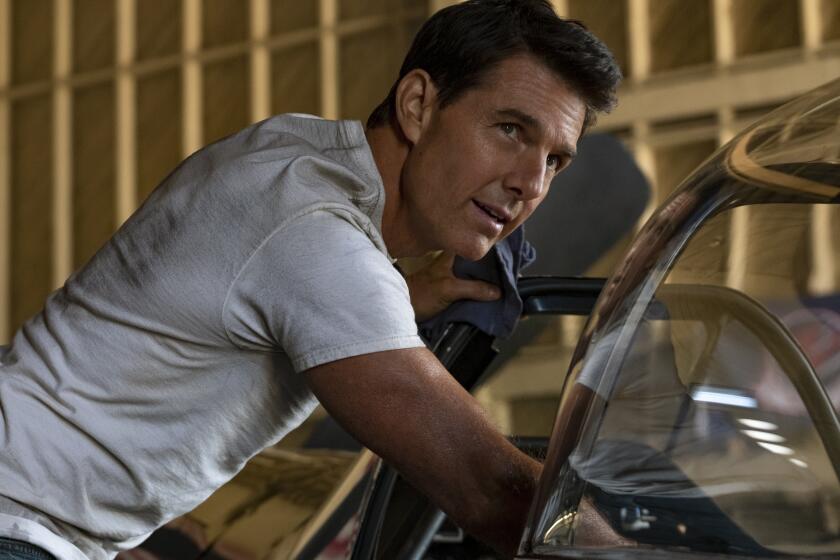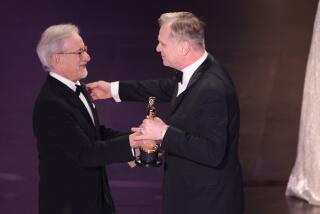Ukrainian group protests Oscar nominations for ‘Top Gun: Maverick’ over alleged ties to Russian oligarch

- Share via
A global Ukrainian group is protesting the Academy of Motion Picture Arts and Sciences’ nomination of “Top Gun: Maverick” for multiple Oscars, including best picture, citing its concerns over the film’s alleged ties to a Russian oligarch sanctioned by Ukraine.
While acknowledging the academy’s “long‐standing support of Ukraine,” the Ukrainian World Congress, a nongovernmental organization, sent a letter to academy President Janet Yang and AMPAS’ board of governors on Monday, asking them to explicitly reject films funded by “Russian oligarchs or other enablers of Russia’s genocidal war on Ukraine” and to “review eligibility” of “Top Gun: Maverick,” starring Tom Cruise, for participation in this year’s Academy Awards.
The Toronto-based group, established in 1967 and representing Ukrainian communities around the world, also asked the academy to condemn “Russia’s war against Ukraine and any attempts to influence Hollywood and American society” during the Oscars ceremony to be held on Sunday.
Representatives for the academy were not immediately available for comment.
The letter comes two months after The Times reported on a breach of contract lawsuit filed by Bradley Fischer, former president of New Republic Pictures. That lawsuit alleged that Monaco-based Russian billionaire Dmitry Rybolovlev played a major role in funding “Top Gun: Maverick,” the “Mission: Impossible” sequels and a slate of other major Paramount films through his role as a “silent partner” in New Republic.
A lawsuit filed against New Republic Pictures alleges controversial Russian oligarch Dmitry Rybolovlev is the ‘silent partner’ behind a slate of Paramount blockbusters, raising questions about the company’s financing.
In 2020, Los Angeles-based New Republic signed a $200-million-plus deal with Paramount Pictures to fund up to a quarter of the budgets on 10 movies in exchange for a share in any profits or losses from the movies.
Rybolovlev and his representatives were not immediately available for comment.
“The Ukrainian World Congress (UWC) expresses its serious concerns over Russia’s influence on the Hollywood film industry. Specifically, as it relates to the nomination of ‘Top Gun: Maverick’ for six prizes at the 95th Academy Awards, including Best Picture,” the letter signed by Paul Grod, the organization’s president, said.
“Rybolovlev’s funding of ‘Top Gun: Maverick’ was not publicly disclosed and there is good reason to believe that his involvement may have led to censorship on behalf of the Kremlin,” the letter goes on to say. “Unlike the original film, ‘Top Gun: Maverick’ makes no direct or indirect reference to Russia. This is hardly a coincidence.”
In an interview with The Times, Grod called on the academy to investigate Russian influence in Hollywood.
“Think about how the Russians have attempted to influence public policy and elections,” Grod said. “I think it is quite logical to see they will try to do the same thing in Hollywood. That is why we are upset by this revelation.”
William Browder, a financier and fierce critic of Russian corruption who once ran one of the largest hedge funds in that country, also questioned the Oscar nominations for “Top Gun: Maverick.”
“The U.S. government is doing everything possible to limit Russian influence in the political process, the banking system and elsewhere,” Browder said in an interview. “Hollywood is one of the places that has more influence than anything and to allow and promote a Russian-funded film for an Academy Award seems counter to everything else in the political sphere.”
Fischer’s lawsuit, filed in Los Angeles Superior Court last December, alleges that Rybolovlev’s money has been pivotal to New Republic’s activities. According to the suit, Rybolovlev, who is not a defendant in the suit, moved his assets out of the venture after Russia invaded Ukraine and Western governments began imposing sanctions on wealthy Russians.
Last October, Rybolovlev was included on a list of sanctioned Russian businessmen and their families and allies issued by Ukrainian President Volodymyr Zelensky.
Rybolovlev, however, is not among more than a dozen Russian oligarchs and their families who’ve been sanctioned by the United States.
The businessman, whose net worth Bloomberg has estimated at $10.1 billion, is based in Monaco. He built his fortune in the Uralkali company, Russia’s major producer of potassium fertilizers, during the 1990s privatization era of the former Soviet Union. In 2010 and 2011, he sold his stake in Uralkali and another fertilizer company for $7 billion.
The billionaire mining magnate owns a vast portfolio of real estate and yachts and a stake in the Bank of Cyprus. He is the majority owner of the professional football club AS Monaco.
One of the world’s top art collectors, Rybolovlev owns a number of great works including pieces by Pablo Picasso, Henri Matisse and Mark Rothko.
For years, Rybolovlev was involved in a protracted legal battle with Swiss art dealer Yves Bouvier. Rybolovlev accused Bouvier, who over a dozen years purchased some 38 artworks for $2 billion on the oligarch’s behalf, of defrauding him.
In 2020, the charges against Bouvier were dismissed when a Monaco court upheld a lower court’s ruling that “the investigations had been conducted in a biased and unfair manner under conditions which seriously and lastingly compromised the balance between the parties,” according to the New York Times.
More to Read
Inside the business of entertainment
The Wide Shot brings you news, analysis and insights on everything from streaming wars to production — and what it all means for the future.
You may occasionally receive promotional content from the Los Angeles Times.











